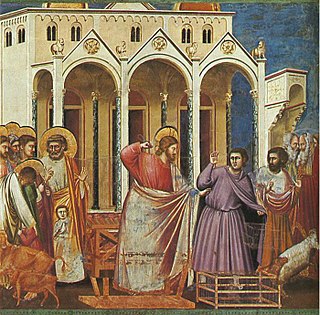
Louis de Blois, O.S.B., was a Flemish monk and mystical writer, generally known under the name of Blosius.

Bangor-on-Dee is a village and community in Wrexham County Borough, Wales, on the banks of the River Dee. Until 1974 it was in the exclave of Flintshire known as the Maelor Saesneg, and from 1974 to 1996 in the county of Clwyd.

The Rule of Saint Augustine, written in about the year 400, is a brief document divided into eight chapters and serves as an outline for religious life lived in community. It is the oldest monastic rule in the Western Church.

The Desert Fathers or Desert Monks were early Christian hermits and ascetics, who lived primarily in the Scetes desert of the Roman province of Egypt, beginning around the third century AD. The Apophthegmata Patrum is a collection of the wisdom of some of the early desert monks and nuns, in print as Sayings of the Desert Fathers. The first Desert Father was Paul of Thebes, and the most well known was Anthony the Great, who moved to the desert in AD 270–271 and became known as both the father and founder of desert monasticism. By the time Anthony had died in AD 356, thousands of monks and nuns had been drawn to living in the desert following Anthony's example, leading his biographer, Athanasius of Alexandria, to write that "the desert had become a city." The Desert Fathers had a major influence on the development of Christianity.

Torridge and West Devon is a constituency represented in the House of Commons of the UK Parliament since 2005 by Geoffrey Cox, a Conservative.

Kellia, referred to as "the innermost desert", was a 4th-century Egyptian Christian monastic community spread out over many square kilometers in the Nitrian Desert about 40 miles south of Alexandria. It was one of three centers of monastic activity in the region, along with Nitria and Scetis. It is called al-Muna in Arabic and was inhabited until the 9th century. Only archaeological sites remain there today.

Buckland Monachorum is a village and civil parish in the West Devon district of Devon, England, situated on the River Tavy, about 10 miles north of Plymouth.

Zeal Monachorum is a village and civil parish in the Mid Devon district of Devon, England, about 18 miles (29 km) north-west of Exeter, situated on the River Yeo. According to the 2001 census, it had a population of 398. The village is in the electoral ward of Taw whose population at the 2011 Census was 1,660.

The Regularis Concordia was the most important document of the English Benedictine Reform, sanctioned by the Council of Winchester in about 973.
The Book of the First Monks is a medieval Catholic book in the contemplative and eremitic tradition of the Carmelite Order, thought to reflect the spirituality of the Prophet Elijah, honored as the Father of the Order.

Crapstone is a village in the county of Devon. The village is located on the edge of Dartmoor, in the parish of Buckland Monachorum and is approximately 1 mile (1.6 km) from the village of Yelverton, 9 miles (14 km) from the city of Plymouth and 5 miles (8 km) from Tavistock.
Regular clergy, or just regulars, are clerics in the Catholic Church who follow a rule of life, and are therefore also members of religious institutes. Secular clergy are clerics who are not bound by a rule of life.

The Good Friday Agreement (GFA) or Belfast Agreement is a pair of agreements signed on 10 April 1998 that ended most of the violence of the Troubles, an ethno-nationalist conflict in Northern Ireland that had prevailed since the late 1960s. It was a major development in the Northern Ireland peace process of the 1990s. It is made up of the Multi-Party Agreement between most of Northern Ireland's political parties, and the British–Irish Agreement between the British and Irish governments. Northern Ireland's present devolved system of government is based on the agreement.

Sesswick is a community in Wrexham County Borough, Wales. It lies south-east of Wrexham near Marchwiel. The population of the community at the 2011 Census was 609.

There have been a variety of Christian views on poverty and wealth. At one end of the spectrum is a view which casts wealth and materialism as an evil to be avoided and even combated. At the other end is a view which casts prosperity and well-being as a blessing from God.
"Pharaoh" is the editorial name given to a fragmentary, eight-line Old English poem on folio 122r of the later tenth-century anthology known as the Exeter Book.
Cnemaspis monachorum, also known commonly as the monks' rock gecko, is a species of lizard in the family Gekkonidae. The species is endemic to Malaysia.
Monachorum is a Latin word meaning "of the monks" which is used as a place name element for several places in the United Kingdom:
The Historia monachorum in Aegypto, also called the Lives of the Desert Fathers, is a combination travelogue and hagiography from the late 4th century AD. It recounts the travels of a band of seven Palestinian monks on a pilgrimage through Egypt between September 394 and January 395. They travelled from south to north, stopping in monasteries and meeting hermits and holy men. The Historia is in essence a collection of stories about these men and their miracles.
William de Haseley was an English monastic writer. He was sub-prior of the Benedictine community at Westminster Abbey and master of the novices. He entered the monastery in about 1266 and compiled the Consuetudinarium Monachorum Westmonasteriensium for his abbot, Richard de la Ware.












